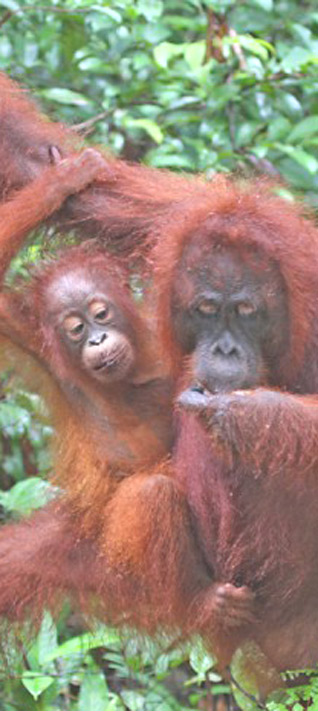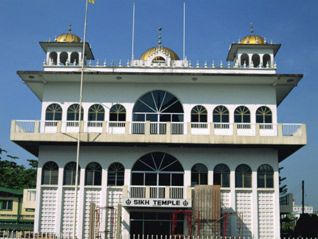Columnists
Borneo
T. SHER SINGH
DAILY FIX
Friday, September 21, 2012
I am forever looking for a break from the ordinary.
When lawyering got too stressful, I would periodically flee to lands which were separated from my home continent by large bodies of water.
When things Sikh began to fill up all of my spare time, I needed a break from them too, and had to run away to remote places, albeit for short periods, looking for places where no Sikhs lived and no “Sikh issues” required attention.
Which, in reality, was nowhere. Have you found a place where the Nishaan does not fly? I haven’t.
But the search continues.
So, when I was in Singapore a few years ago, overwhelmed by a city-state which actually worked and, uniquely, everything functioned smoothly, I began to look around for an escape … to a place which was free of super-efficiency.
Amazing, isn’t it? You yearn all your life for things slick and smart and perfect, and when you find them, you tire of them so quickly! There’s something so comforting about mediocrity.
[Now that I think of it, maybe that is why I love Canada so much. It is a land that has turned mediocrity into an art-form … and we’re proud of it. Truly, odd though it sounds, I mean it as a compliment!]
I knew there were relatively remote and wild places galore in the vicinity - many of the islands in South East Asia were still to be completely overrun by modernity.
Somebody mentioned Borneo.
I knew only a few things about of it, mostly from reading about the goings-on in the area during World War II. And from Gerald Durrell’s expeditions into its wildernesses, looking for rare and near-extinct species.
I knew it was once peopled by tribes, some of which practiced head-hunting and cannibalism. It was also the world of pygmy tribes. And of wild orangutans.
I checked the map and it appeared to be a mere hop, step and jump away. I checked with a travel shop and they said, yes, there was a direct flight to Kuching, the capital of Sarawak.
I recognized the name instantly … from my stamp-collecting days. Sarawak stamps were an exotic rarity.
The City of Kuching, once itself called Sarawak, was now the capital of Sarawak, a province within the suzerainty of Malaysia. It sits on the north-east corner of the island of Borneo - the third largest in the world - midway between mainland Malaysia and mainland Indonesia. Directly north, across the waters from Kuching, lies Vietnam. And Cambodia slightly up the coast.
Borneo itself is divided between Malaysia, Indonesia, and the Kingdom of Brunei.
I am no adventurer, though always seeking adventures. So, first I had to be assured that headhunting and cannibalism were things of the past. Once confirmed, I took off a few days from my itinerary and flew to Kuching.
It proved to be a sedate little city. Things were indeed sleepy and slow, which is what I was looking for. It’s a fairly modern city as well, and the people friendly.
I opted for a tour of the forests which are home to the world’s biggest orangutan population. It was a delight to see them in their natural habitat. Their antics made it obvious why some say that we are related to apes. I could even see a distinct resemblance between them and some of the good souls I see on television regularly.
The next couple of days brought me back into the relative wilderness to see how some of the native tribes had once lived. One group had recreated a number of mini-villages, complete with the huts in which they would have lived, their cooking and eating habits, their family and child-rearing traditions, their history and, yes, their wars, their hunting methods and weaponry …
I was intrigued, at one point, by the blow-guns used by a tribe to hunt. A tribesman was demonstrating how he used a blowpipe - a thin, hollow, approx 4- ft length of bamboo - as a type of airgun to shoot darts (poison-tipped, if you’re doing serious hunting). You insert the dart, and blow sudden and hard, almost explosively, to shoot the projectile, all while aiming to hit your target.
He let me try it, and I managed to hit the target a few times in a row.
Impressed by my talents -- I’m so full of hot air, my detractors will tell you with glee -- he wanted to know which tribe I belonged to.
“Sikh”, I said.
He scratched his chin, then his head, and mumbled: “Yes, I think I’ve heard of them.”
“No, I don’t think you have. They’re not a Borneo tribe.”
“No,” he said, shaking his head, “I think there are some of your tribe in Kuching!”
I didn’t believe him.
I touched my turban, and said: “Like this?”
He thought about it for a bit, and then nodded his head. “When you go back to Kuching, ask some people there, they’ll tell you where.”
I didn’t believe he had it right, and gave it no serious thought.
The next morning, walking around town, I was chatting with someone and casually asked him if he’d ever met a Sikh before.
My mistake!
He nodded vehemently, and pointed in an arc down the road, suggesting a couple of miles away.
I probed further, and saw that he seemed to be sure.
I summoned a taxi and asked my friend to tell the driver where to take me.
Well, so much for my wanting to take a break from Sikhs.
Twenty minutes later, I was sitting in a grand, multi-storied gurdwara, having langar - samosas, pakoras, mitthaaee and chai - with a young man with the most extraordinarily gorgeous beard I’d ever seen. I made a mental note: if Manu Kaur Saluja in New York wants to do another portrait of Ranjit Singh, she should use him as a model!
[I promptly photographed him. I told him why. If he blushed, I couldn’t see for his bushy whiskers!]
The young Sardar regaled me with stories of the earliest settlements of Sikhs not only in Kuching but in the remotest parts of the wilderness all over the island. And in the islands beyond.
A Sikh on the moon predating Neil Armstrong’s landing, I could swallow. But here in Borneo?
Sikhs have been here since the early 1880s. They were the pride of many of the private armies of the local Sultans, and later of the European colonizers. Followed by tradesmen, professionals, policemen, entrepreneurs … and their families.
All of the above had receded in my memory until this morning. The story of the 4th Borneo Annual Sikh Games on the sikhchic.com homepage brought forth a flood of sweet images.
It is so true: the Nishaan indeed flies proud and tall even in the remotest outposts of the world.




